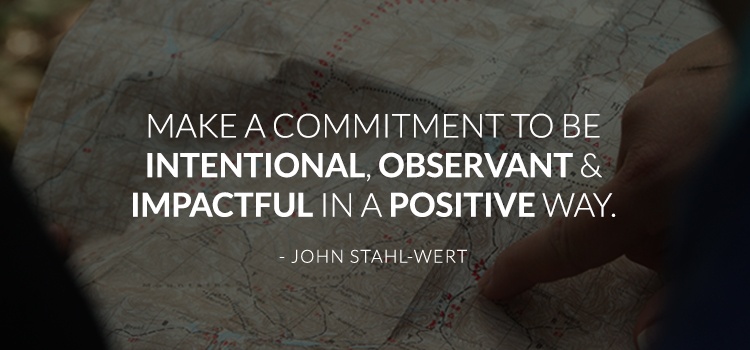Did you know the idea of forecasting a new president’s success from what he gets done during his first 100 days began with Franklin Roosevelt when he, in his first term, began tackling the challenges of the Great Depression in 1933? Since then, the 100-day standard, while not precise, has become a popular concept used to predict the effectiveness of every president.

You may not be an elected official, but if you are considering taking on new leadership responsibilities in a business or organization, what you accomplish in the first days, weeks, months, and year—and how you go about it—will bear significant consequences. With that in mind, consider the following tips on how a Serving Leader can make the most of his or her first “100 Days.”
Before Saying "Yes"
Before entertaining the notion of stepping into a leadership role, consider this: the people you lead will be searching for indications—in your words, gestures, and behaviors—of what life will be like for them now that you're in charge. Your followers instinctively know that their well-being will be greatly impacted by the kind of person you are and the level of intentionality and excellence you bring to the job. Serving Leaders think very carefully about the well-being of the people they are about to lead, and they make a commitment to be intentional, observant, and impactful in a positive way.
Day 0: Tackle 3 Critical Questions
In the sanctuary of your own heart and mind, take the time to address three fundamental questions (write your answers down):
- Who are you serving? Think about the customers your organization exists to serve. Think about the investors and board members and partners who are looking to you for leadership. Think about your teammates and colleagues—your followers—who will do most of the organization's work. You are stepping into leadership to serve others, not yourself.
- Why does the organization or cause matter? Why will excellent performance—your own, your organization's, and your people's—be worth it in the end? Gain clarity on the great purpose that you will be marshaling every resource to pursue.
- How will you and your people conduct business? What are the non-negotiable, core values that will guide your decisions and the way your organization operates day-to-day? Take time to get very clear on these behaviors and values.
Day 1: Get to Know Those You Will Lead
Meet your people. Without being hurried, reach out to as many as you can. Introduce yourself. Ask them to introduce themselves to you. Listen—actively, appreciatively, respectfully—to what they tell you. A simple preamble may be, “We have lots of work to do, a cause that matters, and a very bright future. But before we just jump into the work, I very much want to make your acquaintance.”
Week 1: Let Them Hear Your Heart
Meet with your people. Meet them face-to-face if you can, or by Zoom, Skype, FaceTime, or phone. Then, meet with your teams to learn who they are, what they know and do, and what ways they contribute to the greater goal. And, finally, convene the whole company—in person, or digitally—to hear your heart and values, see your passion and purpose, and to know that you are already paying attention to them. You heard them, you value them, and you’re going to lay out before them a challenging and important roadmap—a purposeful plan—to guide the enterprise into the future. To quote a leader I love and respect, “Don't promise them Easy! Promise them Worth it!” Then wish them a great weekend and invite them to return on Monday ready to jump into a great journey with you.
Quarter 1: Focus On 4 Objectives
Accomplish these four goals in your first 12 weeks:
- Demonstrate and talk about your core values. Let everybody hear about it. And let your own values-aligned behavior win any arguments. Call attention to your people when you catch them living out the values you have espoused. You’re building trust. You’re drawing a line in the sand that your word is your bond. You’re raising the stakes on accountability, starting with yourself.
- Share the great purpose your organization exists to serve. Bring your people stories from customers and from the world that illustrate how your enterprise makes a difference that matters. Talk to individual teammates about the part they play, however seemingly small, in serving your great purpose.
- Maintain your personal and relational touch. Learn names, make notes about families, intentionally follow up at a personal level to reinforce human connections and personal care.
- Identify and tackle problems that can easily be fixed and be classified as short-term “wins.” Show action. Score points. Take pain away and build confidence.
At the end of your first quarter, throw a party! Express your appreciation. Ask your leaders and managers—following a framework you provide them—to benchmark improvements, showcase wins, and celebrate contributors. Give a “state of the organization” report. Keep it brief, but punchy. Communicate what you’ve learned and what you appreciate. Also, take this time to share your vision. Talk about what you see both now, and in the future for the organization. Finally, announce the big, next step and the plan to get there.
A Final Word
There is a significant difference in approach, during the first 100 days of your tenure as a Serving Leader, when compared to the American presidency. In our presidential politics, voters choose the person they want based on what they have learned about that individual during the campaign, including the particular promises made by the candidate. The first 100 days of an elected leader’s tenure need to demonstrate that they are doing what they promised. That said, your first “100 days” as an organizational leader should focus on winning trust, discovering who the people are and what they have to offer, honoring what has been accomplished in the past, showing your people that you're with them, and earning the right to step in and actively lead.
In your first 100 days, go slow at first so you can go fast and together. Fortify the bonds that link you to your great team members. And, then, go! You’ve got an important mission to serve!
To be continued.
John Stahl-Wert is co-author of the best-selling book "The Serving Leader." He serves as President of Newton Institute and Director of its Center for Serving Leadership. Learn more at www.centerforservingleadership.com.
Photo by Jean-Frederic Fortier (unsplash.com)

